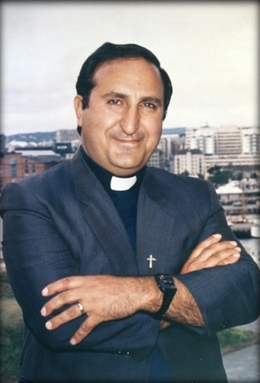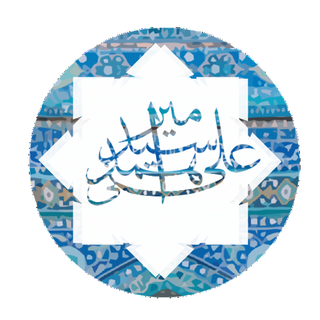
Sufism, also known as Tasawwuf, is a mystic body of religious practice emerged from the teachings of Ali recited by Hasan al-Babri, today found not only within Sunni Islam but also within Shia Islam, which is characterized by a focus on Islamic purification, spirituality, ritualism, asceticism and esotericism. It has been variously defined as "Islamic mysticism", "the mystical expression of Islamic faith", "the inward dimension of Islam", "the phenomenon of mysticism within Islam", the "main manifestation and the most important and central crystallization" of mystical practice in Islam, and "the interiorization and intensification of Islamic faith and practice".
Freedom of religion or belief in teaching, practice, worship, and observance in the Islamic Republic of Iran (IRI) is marked by Iranian culture, major religion and politics. The Constitution of the Islamic Republic of Iran mandates that the official religion of Iran is Shia Islam and the Twelver Ja'fari school, and also mandates that other Islamic schools are to be accorded full respect, and their followers are free to act in accordance with their own jurisprudence in performing their religious rites. The Constitution of Iran stipulates that Zoroastrians, Jews, and Christians are the only recognized religious minorities. The continuous presence of the country's pre-Islamic, non-Muslim communities, such as Zoroastrians, Jews, and Christians, had accustomed the population to the participation of non-Muslims in society.

Christianity in Iran dates back to the early years of the religion during the time of Jesus, predating Islam. The Christian faith has always comprised a minority in Iran under its previous state religions; initially Zoroastrianism in historical Persia, followed by Sunni Islam in the Middle Ages after the Arab conquest, and Shia Islam since the Safavid conversion of the 15th century; although it had a much larger representation in the past than it does today. Iranian Christians have played a significant part in the historical Christian mission: currently, there are at least 6000 churches and 380,000–1,500,000 Christians in Iran.

Haik Hovsepian Mehr was an Iranian Armenian Protestant minister and bishop of the Jama'at-e Rabbani church. After the Islamic Revolution of 1979, he was one of the few Christian leaders to continue to evangelize. In 1994, he disappeared after protesting the Iranian government's treatment of converts to Christianity and is generally assumed to have been murdered by the state. The state, however, accuses the People's Mujahedin of Iran for his murder.
Jama'at-e Rabbani is the Iranian branch of the Assemblies of God, one of the largest evangelical Pentecostal Christian churches. It has its centre in Tehran, Iran.

Ahmad Hokmabadi Tabrizi, later known as Ahmad Kasravi, was a pre-eminent Iranian historian, jurist, linguist, theologian, a staunch secularist and intellectual. He was a professor of law at the University of Tehran, as well as an attorney and judge in Tehran, Iran.

Islam began to make inroads into the Armenian Plateau during the seventh century. Arab, and later Kurdish, tribes began to settle in Armenia following the first Arab invasions and played a considerable role in the political and social history of Armenia. With the Seljuk invasions of the eleventh and twelfth centuries, the Turkic element eventually superseded that of the Arab and Kurdish. With the establishment of the Iranian Safavid dynasty, Afsharid dynasty, Zand Dynasty and Qajar dynasty, Armenia became an integral part of the Shia world, while still maintaining a relatively independent Christian identity. The pressures brought upon the imposition of foreign rule by a succession of Muslim states forced many lead Armenians in Anatolia and what is today Armenia to convert to Islam and assimilate into the Muslim community. Many Armenians were also forced to convert to Islam, on the penalty of death, during the years of the Armenian Genocide.

Ghorban Dordi Tourani, also called Ghorban Tori, was an Iranian convert to Christianity and a lay minister. He lived and worked in Gonbad Kavous, Golestan, Iran.

Christians have historically comprised a small community in Afghanistan. The total number of Christians in Afghanistan is currently estimated to be between 15,000 and 20,000 according to International Christian Concern. Almost all Afghan Christians are converts from Islam. The Pew Research Center estimates that 40,000 Afghan Christians were living in Afghanistan in 2010. The Islamic Republic of Afghanistan did not recognize any Afghan citizen as being a Christian, with the exception of many expatriates. Christians of Muslim background communities can be found in Afghanistan, estimated between 500-8,000, or between 10,000 to 12,000.

Mir Sayyid Ali Hamadani was a Persian scholar, poet and a Sufi Muslim saint of the Kubrawiya order. He was born in Hamadan, Iran and preached Islam in Central Asia and Kashmir as he travelled to practice Sufism. He died in Kashmir and was buried in Khatlan, Tajikistan in 1384 CE, aged 71–72. Hamadani was also addressed honorifically throughout his life as the Shāh-e-Hamadān, Amīr-i Kabīr, and Ali Sani.
Religion in Iran has been shaped by multiple religions and sects over the course of the country's history. Zoroastrianism was the main followed religion during the Achaemenid Empire, the Parthian Empire, and the Sasanian Empire. In 651 AD, the Rashidun Caliphate conquered Persia and spread Islam as the main religion. Sunnism was the predominant form of Islam before the devastating Mongol conquest but subsequently, Shi'ism became eventually utterly dominant in all of Iran with the advent of the Safavids (1501-1736).

Christian population growth is the population growth of the global Christian community. According to a 2011 Pew Research Center survey, there were more than 2.2 billion Christians around the world in 2010, more than three times as many as the 600 million recorded in 1910. However, this rate of growth is slower than the overall population growth over the same time period. In 2020, Pew estimated the number of Christians worldwide to be around 2.38 billion. According to various scholars and sources, high birth rates and conversions in the Global South were cited as the reasons for the Christian population growth.
Youcef Nadarkhani is an Iranian Christian pastor who was sentenced to death in Tehran as being a Christian having been born into Islam. Initial reports, including a 2010 brief from the Iranian Supreme court, stated that the sentence on Nadarkhani was based on the crime of apostasy, renouncing his Islamic faith. Government officials later claimed that the sentence was instead based on alleged violent crimes, specifically rape and extortion; however, no formal charges or evidence of violent crimes have been presented in court. According to Amnesty International and Nadarkhani's legal team, the Iranian government had offered leniency if he were to recant his Christianity. His lawyer Mohammad Ali Dadkhah stated that an appeals court upheld his sentence after he refused to renounce his Christian faith and convert to Islam In early September 2012, Nadarkhani was acquitted of apostasy, but found guilty of evangelizing Muslims, though he was immediately released as having served prison time. However, he was taken back into custody on Christmas Day 2012 and then released shortly afterwards on 7 January 2013.

Saeed Abedini is an Iranian American Christian pastor who was imprisoned in Iran in 2012 based on allegations that he compromised national security. During his imprisonment, Abedini became internationally known as a victim of religious persecution. Following international pressure, along with other American prisoners, Abedini was released from prison on 16 January 2016.
Rachid Hammami, best known as Brother Rachid is a Moroccan former Muslim and convert to Christianity whose father is an Imam. He is a Christian apologist and critic of Islam, and hosts a weekly live call-in show on Al Hayat TV where he compares Islam and Christianity.

Sufism in Bangladesh is more or less similar to that in the whole Indian subcontinent. India, it is claimed, is one of the five great centers of Sufism, the other four being Persia, Baghdad, Syria, and North Africa. Sufi saints flourished in Hindustan (India) preaching the mystic teachings of Sufism that easily reached the common people, especially the spiritual truth seekers in India. Sufism in Bangladesh is also called pirism, after the pirs or teachers in the Sufi tradition.

Nabeel Asif Qureshi was a Pakistani-American Christian apologist. Raised by a devout Muslim family from the Ahmadi sect, Qureshi converted to Christianity as a university student following several years of debate with a Christian friend. After earning his doctorate in medicine from Eastern Virginia Medical School, he subsequently completed a M.A. in religion at Duke University and M.Phil in Judaism and Christianity at the University of Oxford, becoming a Christian apologist with Ravi Zacharias International Ministries (RZIM) from 2013 until 2017. Qureshi authored three books: Seeking Allah, Finding Jesus: A Devout Muslim Encounters Christianity, Answering Jihad: A Better Way Forward, and No God But One—Allah or Jesus.
António de Jesus was a Portuguese figure who flourished in late 17th and early 18th century Safavid Iran. Originally an Augustinian friar and missionary, he converted to Shia Islam during the early reign of Shah (King) Sultan Husayn and took the name Aliqoli Jadid-ol-Eslam. He subsequently became an apologist of Shi'ism as well as a major polemicist against Christianity, Sufism, Judaism, Sunnism, philosophers and antinomians. In addition, after conversion, he served as an official interpreter at the royal court in Isfahan. Aliqoli Jadid-ol-Eslam was one of the late 17th century converts in Iran who "helped reaffirm the Majlesi brand of conservatism".









